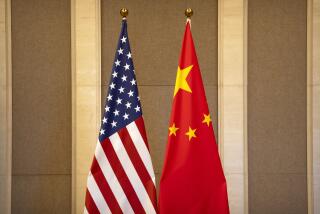China a key player in war on terrorism
- Share via
BEIJING — China likely will play a major role in the scope and success of U.S. military action in Afghanistan.
So far, Beijing has offered moral support but urged restraint as Washington mobilizes for a possible strike against terrorist Osama bin Laden’s hideout in neighboring Afghanistan.
As the region’s dominant state, China is carefully weighing its options. The country’s leaders quickly denounced last week’s attacks on the World Trade Center and the Pentagon and pledged to cooperate with any war on global terrorism.
But the extent of that cooperation remains unspecified. Also unclear is what strings might be attached.
Chinese Vice Foreign Minister Wang Guangya recently suggested that any military response should come from a multinational force backed by the United Nations Security Council. There, Beijing has veto power. Chinese participation will depend on what the response turns out to be.
“Our attitude towards international cooperation against terrorism is positive.” Wang said. “It all depends on the final formula.”
In a conversation with British Prime Minister Tony Blair on Tuesday, Chinese President Jiang Zemin spelled out the formula he’s looking for: Any military action must be based on concrete evidence; it must follow international law; it must not harm innocents.
Chinese Foreign Minister Tang Jiaxuan is expected to offer additional details Friday during a meeting with U.S. policymakers in Washington.
Chinese counterterrorism experts plan to visit Washington following Tang’s meeting. U.S. diplomatic officials in Beijing have expressed optimism about China’s public statements but have declined to comment on exactly where the two sides stand.
Behind the supportive rhetoric, Beijing has huge concerns about unilateral U.S. action.
Afghanistan shares 76 kilometers of China’s western border. Chinese leaders aren’t thrilled about the prospect of full-scale U.S. military operations going on next door. Any conflict could cause an influx of refugees fleeing Afghanistan. And Northwest China has a large, restless Muslim population that almost certainly won’t take kindly to an armed crackdown on other Muslims.
Reports in the American media last week accused Beijing of cozying up to Afghanistan’s Taliban government in an effort to cut off Taliban support and training of militant Muslim separatists in China’s Xinjiang province. The Wall Street Journal reported China was offering economic and technical assistance in return.
The story apparently touched a nerve. The Chinese Foreign Ministry wasted no time in blasting the account. Spokesman Zhu Bangzao called the allegations “absurd” and pointed out that China has no formal relations of any kind with the Taliban. Beijing closed its embassy in Afghanistan in 1993 after civil war broke out there and has not sent back resident personnel since.
“China has no selfish interest on the Afghan issue,” Zhu told People’s Daily, the official state-run newspaper of China’s communist party. “What China has done is to persuade different factions in Afghanistan to make peace.”
Despite Beijing’s reservations, supporting U.S. action in Afghanistan could make sense for China in several ways.
Collapse of the Taliban regime might help dry up resources for Muslim separatists in China. Beijing is anxious to assume more of an international leadership role after landing the 2008 Olympic Games and gaining membership into the World Trade Organization. And there is some resentment over several Chinese citizens who were killed during last week’s terrorist attacks.
Two were passengers on American Airlines Flight 77 that crashed into the Pentagon. Others -- employees of several Chinese companies in the World Trade Center -- remain missing, according to Chinese authorities.
Beijing also floated the possibility Tuesday of linking China’s support for U.S. action in Afghanistan to changes in U.S. policy toward Taiwan -- a move that almost certainly won’t be acceptable to Washington. The United States has an agreement to help Taiwan if Beijing attempts to forcibly reunite the island with the communist mainland.
“China ... has reasons to ask the United States to give its support and understanding in the fight against terrorism and separatists,” Zhu said at a news conference in Beijing. “We should not have double standards.”
Chinese cooperation undoubtedly would make Washington’s job much easier. China’s closest ally in the region, Pakistan, figures prominently into U.S. plans and already has delivered an ultimatum to Afghanistan on the White House’s behalf: Hand over bin Laden or face the consequences. A Chinese diplomat visited Islamabad for discussions with the Pakistani government on Tuesday.
Chinese opposition, however, could cause major headaches. Beijing wields considerable influence in Pakistan. And China maintains the world’s largest standing army of some 28 million soldiers. Older Americans still vividly remember China’s role in helping thwart U.S. objectives in two other Asian conflicts: Korea and Vietnam.
What happens during the next few weeks could thaw or freeze U.S.-China relations for the foreseeable future. The issue may not be decided before President Bush’s scheduled visit to China for an economic summit in October.
More to Read
Sign up for Essential California
The most important California stories and recommendations in your inbox every morning.
You may occasionally receive promotional content from the Los Angeles Times.










